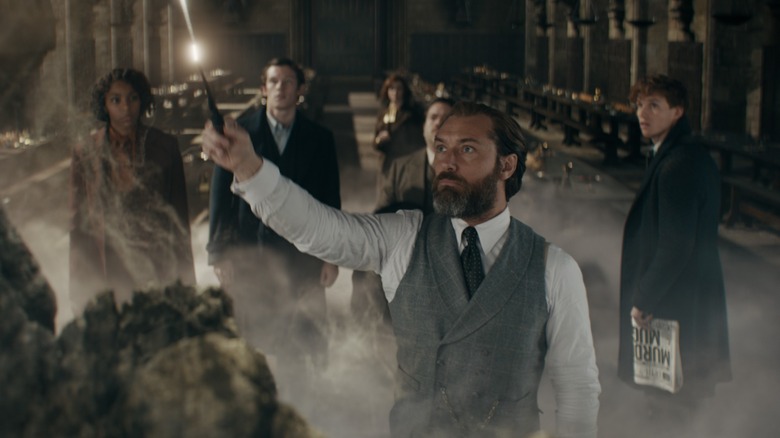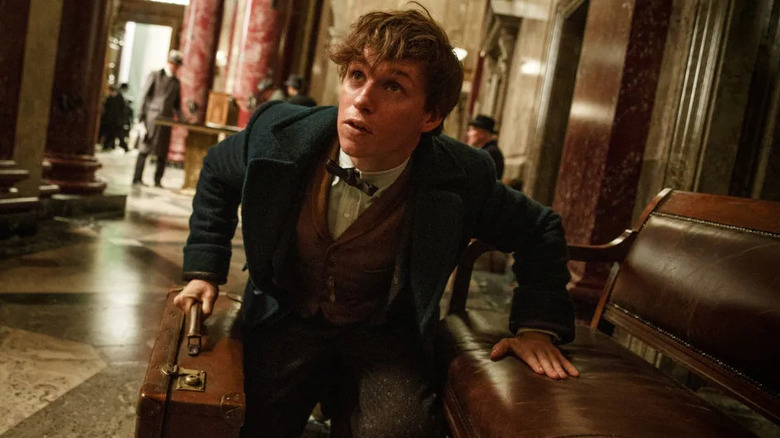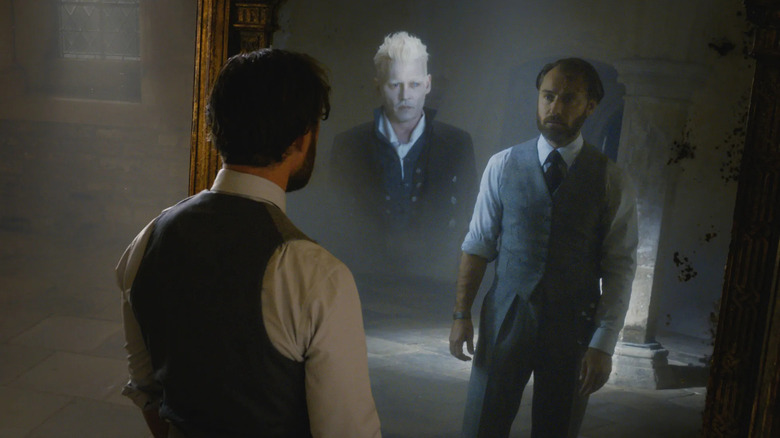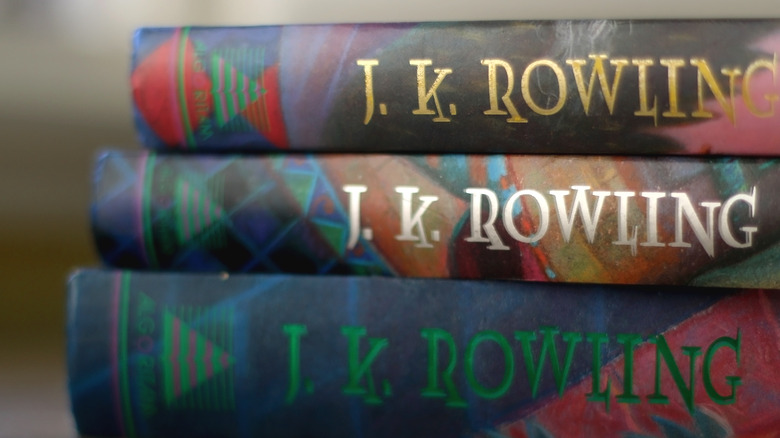How The Fantastic Beasts Franchise Stumbled
After many months of delays and a furor of controversy, the third film in the "Fantastic Beasts" series, "The Secrets of Dumbledore," limped into theaters in North America. While the reviews were mildly kinder than those for its predecessor, "The Crimes of Grindelwald," the box office grosses have fallen hard. The film raked in $58 million from 22 overseas markets, according to box office data via Variety, which is well below the $191 million international opening for the second movie. It still has several key territories left to premiere in, but it seems that Warner Bros. are not optimistic for the franchise's future.
Variety also noted that there is speculation about whether "Fantastic Beasts" will ever fulfill its plans for a five-film franchise. At the moment, there's no screenplay for a fourth installment and executives are waiting to see how things pan out with "The Secrets of Dumbledore" before giving any follow-up the green light. It's a startling fall for a series that was once the jewel in the studio's crown, a guaranteed billion-dollar hit machine that was utterly untouchable in the realm of blockbuster cinema. Now, the series that was too big to fail is sliding into bleak territory. To put it bluntly, there is really only one person to blame.
A creator's worst whims
The Potterverse is unique in pop culture because it is stridently controlled by one person: its creator J.K. Rowling. She has a level of creative power over every aspect of the IP — the books, movies, theme park attractions, and so on — that really doesn't exist anywhere else in the 2020s. Consider how, for example, the Marvel Cinematic Universe wasn't exclusively created by Stan Lee and it's not beholden to the specifications of one artistic figure. Every minute detail of the Harry Potter world comes from the mouth of Rowling and that's inspired more than a few eye rolls, even from hardcore fans. Consider how Rowling revealed that Dumbledore was gay and suggested that he was in an intimate relationship with Grindelwald, while never explicitly referencing the character's sexuality in the books. Her "red pen in the margins" approach to diversity in the original books also left a sour taste in some people's mouths, a matter exacerbated by her messy and stereotype-ridden portrayals of Native American wizards in the Pottermore mythos. While there are obvious upsides to having such a hands-on creator, one who lavishes in the weird details that are oft-overlooked by others, it's an approach that has seen Rowling fall prey to her worst artistic habits.
The "Fantastic Beasts" films fell prey to these instincts in the most overstuffed and tedious manner possible. It didn't help that, as the sole credited screenwriter of the first two movies, Rowling was able to run rampant with these tics with nobody to temper them. It was also her first experience writing a film and it really shows in the structural flabbiness of the second film, which features a lot of scenes of people standing around and yelling key exposition at one another. What should have been a cute lark involving magical animals in New York City of the Jazz Age quickly became an overstuffed prequel to the original narrative, one that simply did not work in terms of timing or characterization.
It took no time at all for the fun and low-stakes silliness of Newt Scamander and his adorable creatures to be shoved aside in favor of a Dumbledore versus Grindelwald story. That would have been accepted by fans if the ensuing action had any kind of tonal or character cohesion. It didn't. Rowling went into overdrive trying to draw direct parallels between Grindelwald's evil plans and literal Nazis, thanks to the series' setting lining up with the impending Second World War. The Potter franchise has always been less-than-subtle when it comes to its political allegory but in the context of a children's series it made some sense. Now, it felt kind of gross but it also screwed with the slightest of characterizations we knew about these new figures in the story. Any emotional or political ambiguity that Dumbledore may have had went out the window, leaving poor Jude Law to rely on pure charm to pull through a sloppy script.
A spotty track record with inclusivity
Suddenly, it felt as though Rowling had watched the "Star Wars" prequels and felt the need to tie every single detail of her new series into the narrative of her old one. If you thought C-3PO being Darth Vader's childhood robot was silly then think about the reveal that Nagini, Voldemort's evil snake, is actually an unlucky Asian woman who is cursed to stay in snake form. Rowling claimed she'd waited years to reveal that twist. If so, then it certainly puts a damper on the heroic beheading of Nagini that punctuated Neville Longbottom's arc. As many Asian fans and critics noted, Rowling's track record with depictions of Asian characters is sloppy at best (hello, Cho Chang), so this new addition felt like salt on an already raw wound.
Rowling's issues with inclusivity quickly reared their ugly head. Fans wondered why a series set during the Jazz Age and Harlem Renaissance was so white. While there are obvious issues to the backstory of Dumbledore's love for Grindelwald (was he really willing to become a wizard fascist for some good sex?), the decision to just outright remove the queer text from the film only made fans angrier. It was revealed this week that Warner Bros. cut out a couple of moments from the finished movie that acknowledge Dumbledore's sexuality. The excuse was that they wanted the film to adhere to the censorship restrictions of the Chinese government but, given Rowling's current transphobic rampage in the press and on social media, that justification fell flat. Variety reported that the studio only needed to cut six seconds to screen time to make the story not gay. Six seconds. That hardly suggests that Rowling and company were truly committed to LGBTQ+ representation to begin with.
The writing on the wall
Of course, we can't talk about the failure of "Fantastic Beasts" without mentioning the elephants in the room. This is a saga that has been mired in controversy. Recently, Ezra Miller was arrested in Hawaii for disorderly conduct and harassment (they had previously been caught on camera strangling a fan). Johnny Depp exited the franchise after losing a libel trial against his ex-wife regarding accusations that he was a "wife beater." And then there's Rowling herself, who has slowly evolved from one of the most universally beloved pop culture figures to a divisive nightmare with a seemingly obsessive distaste for trans people. On the same day that LGBTQ+ Brits protested in London to condemn the U.K. Government's decision not to outlaw conversion therapy for trans people, Rowling had a cozy lunch with a variety of infamously "gender critical" women who have become defined in the press for their callous opposition to trans lives. Rowling has spread many lies about trans people and has even been credited by right-wing politicians in America legislating against trans kids as an expert in the field.
To put it bluntly, I'm not sure Rowling's transphobia is directly hurting the box office grosses of "Fantastic Beasts" in a way that Warner Bros. would listen to. People still buy Harry Potter books in droves, pay obscene amounts of money to visit Hogwarts at Universal Studios, and have pre-ordered the upcoming video game set in the Potter world. Frankly, a multi-millionaire who has had this kind of impact on the entertainment world is never going to face truly tangible repercussions. But the pushback from the LGBTQ+ community and its allies is making a difference in some way. The rest of the problems with the series can be found in the hole that Rowling has dug for herself. These films are fully representative of her worst habits as a creator, untethered from any sort of criticism or pushback from Warner Bros., a studio too afraid to lose its cash cow.
The Potter franchise will never die. Rowling will, alas, never be able to kill it. But the "Fantastic Beasts" story has long outstayed its welcome, blowing away so much goodwill and potential in favor of something that seems to appeal to nobody. Warner Bros. will make more Potter movies or TV series, that much is certain, but this particular arc's failure should be a warning sign of what not to do for themselves and many a studio head.



